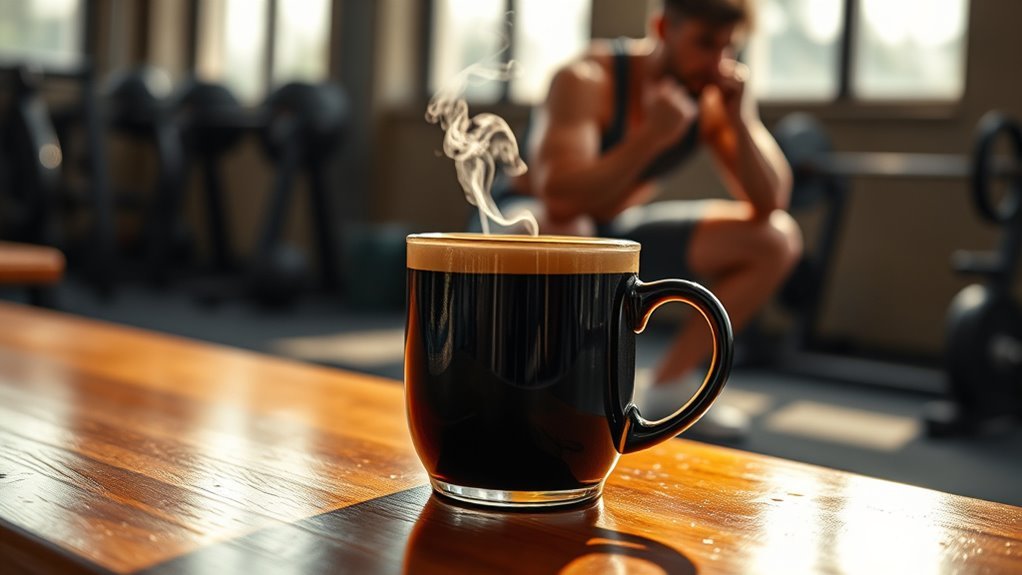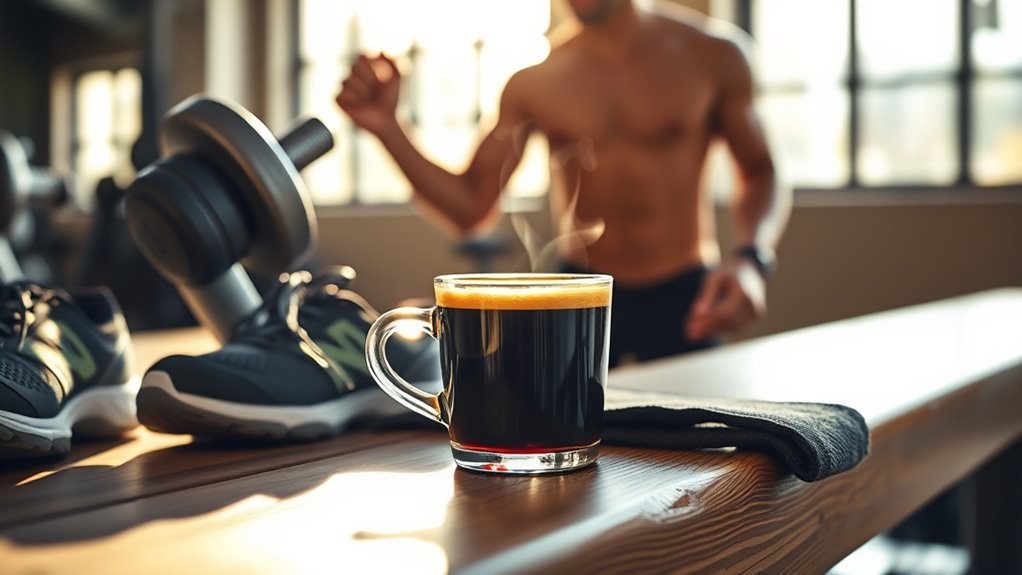How Coffee Can Enhance Your Workout Performance
Coffee can boost your workout by increasing energy and focus through caffeine’s stimulating effects on your nervous system. It blocks fatigue-causing receptors, enhances mood, and helps spare muscle glycogen, extending endurance. Drinking coffee 30–60 minutes before exercise maximizes these benefits, but be mindful of dosage and timing to avoid jitters or sleep disruption. Pair it with carbs and stay hydrated for best results. Explore more to optimize your coffee-fueled performance effectively.
The Science Behind Coffee and Exercise

Although you might think of coffee as just a morning pick-me-up, its active ingredient, caffeine, plays a significant role in enhancing exercise performance. When you consume coffee, caffeine enters your bloodstream and influences your central nervous system, improving focus and reducing perceived exertion. Your coffee metabolism varies individually, affecting how quickly caffeine works and how long its effects last. Understanding your caffeine tolerance is essential; too little may not optimize your workout, while too much can cause jitters or disrupt recovery. By mastering your unique response, you can harness coffee’s power to push past physical limits and feel more energized during exercise. This knowledge gives you the freedom to tailor coffee intake strategically, turning a simple beverage into a tool for maximizing your workout potential.
How Caffeine Boosts Energy Levels
When you consume caffeine, it blocks adenosine receptors in your brain, reducing fatigue and boosting your energy levels. This effect not only enhances your endurance during workouts but also sharpens your mental alertness, helping you stay focused. Understanding how caffeine works can help you maximize your exercise performance efficiently.
Caffeine and Energy
Caffeine is a natural stimulant that can considerably boost your energy levels by blocking adenosine receptors in the brain, which helps reduce feelings of tiredness. When caffeine enters your system, its metabolism triggers a cascade of effects that enhance energy regulation, allowing you to tap into increased focus and alertness. This means you can push through workouts feeling sharper and more energized.
Here’s how caffeine powers your energy:
- Blocks fatigue-inducing adenosine receptors
- Stimulates the central nervous system for increased alertness
- Enhances dopamine release, improving mood and motivation
- Accelerates caffeine metabolism, optimizing energy use
Embracing caffeine smartly gives you freedom from sluggishness and reveals your full workout potential.
Impact on Endurance
Since endurance relies heavily on your body’s ability to sustain energy over time, the way caffeine influences energy metabolism can directly enhance your stamina during workouts. Caffeine stimulates your central nervous system, increasing fat oxidation and sparing glycogen, which delays fatigue and lets you push further. This means you can maintain steady energy levels longer, empowering you to break limits and embrace freedom in movement. Additionally, caffeine supports hydration balance by promoting fluid retention, essential for prolonged exercise, and aids muscle recovery by reducing perceived exertion and muscle soreness. By integrating coffee thoughtfully into your routine, you harness its scientifically backed benefits to optimize endurance, maintain hydration, and accelerate recovery, ultimately revealing a new level of workout performance and personal freedom.
Mental Alertness Boost
Although you might not realize it, the surge in mental alertness you feel after drinking coffee is due to caffeine’s ability to block adenosine receptors in your brain. This blockage reduces fatigue and sharpens your mental clarity, allowing you to tap into enhanced cognitive function. When you’re ready to push your limits, caffeine helps you stay focused and energized, giving you the freedom to conquer your workout goals with precision.
Key benefits include:
- Increased mental clarity for sharper decision-making
- Enhanced cognitive function to improve reaction times
- Reduced perception of effort during intense exercise
- Sustained alertness to maintain motivation and drive
Coffee’s Role in Enhancing Focus and Concentration
When you need to stay sharp during a workout, coffee can be a powerful ally. Its caffeine content stimulates your central nervous system, improving neural activity linked to focus techniques and concentration exercises. This heightened mental clarity helps you maintain freedom from distractions, letting you fully engage in your routine.
| Benefit | Mechanism | Practical Tip |
|---|---|---|
| Enhanced Focus | Adenosine receptor blockade | Sip coffee 30 mins before |
| Improved Alertness | Increased dopamine release | Combine with breathing drills |
| Consistent Concentration | Boosted neural firing rate | Use during focus techniques |
Impact of Coffee on Physical Endurance

If you want to push your limits during workouts, coffee can be a game-changer for your physical endurance. Scientific studies show that coffee consumption enhances endurance training by increasing your body’s ability to burn fat, preserving glycogen stores, and delaying fatigue. When caffeine enters your system, it stimulates the central nervous system, allowing you to sustain effort longer and feel less exertion. Here’s why coffee is a powerful ally for your endurance:
Coffee boosts endurance by enhancing fat burning, preserving energy, and reducing fatigue during workouts.
- Boosts fat oxidation, sparing muscle glycogen
- Enhances muscle contraction efficiency
- Reduces perceived exertion and pain sensation
- Increases adrenaline levels, improving stamina
Optimal Timing for Consuming Coffee Before Workouts
To get the most from your coffee before a workout, you’ll want to time it right—typically about 30 to 60 minutes prior. This window allows caffeine to absorb fully and start boosting your energy and focus. Just be sure not to drink it too late, or it might interfere with your sleep and recovery.
Ideal Pre-Workout Window
Anyone looking to maximize the benefits of coffee for workout performance should pay close attention to timing. Your ideal pre-workout window hinges on balancing pre workout timing and caffeine sensitivity. Consuming coffee too early or too late can blunt its energizing effects or cause jitters.
To find your perfect window, consider:
- Drink coffee 30-60 minutes before exercise for peak alertness.
- Adjust timing based on your caffeine sensitivity to avoid crashes.
- Avoid coffee immediately before workouts if you’re prone to stomach discomfort.
- Experiment with timing to discover what fuels your freedom to push limits.
Mastering this timing empowers you to harness coffee’s full potential, boosting endurance, focus, and strength without unwanted side effects. Your freedom to perform at your best starts with smart, personalized timing.
Caffeine Absorption Time
Because caffeine absorption varies among individuals, understanding its timing is key to optimizing your workout performance. When you drink coffee, caffeine metabolism kicks in, but absorption rates depend on factors like your genetics, stomach contents, and hydration. Generally, caffeine reaches peak levels in your bloodstream within 30 to 60 minutes. To harness this, aim to consume coffee about 45 minutes before you start exercising. This timing allows caffeine to maximize alertness, endurance, and fat-burning potential just as you hit your stride. Remember, mastering your caffeine metabolism gives you the freedom to fine-tune your routine—empowering you to push harder and longer. By syncing your coffee intake with your body’s absorption rhythm, you activate a powerful edge in every workout.
Avoiding Late Consumption
Timing your coffee intake isn’t just about hitting peak caffeine levels before exercise; it’s also about avoiding consumption too late. Drinking coffee too close to bedtime can disrupt your sleep, impairing post workout recovery and overall performance. You want to respect your body’s caffeine tolerance to maximize benefits without side effects. Aim to consume coffee at least 3-4 hours before sleep. This way, you harness caffeine’s power without sacrificing rest or recovery.
Keep these tips in mind:
- Avoid coffee within 6 hours of bedtime
- Monitor your caffeine tolerance and adjust accordingly
- Prioritize sleep quality for effective recovery
- Use coffee strategically, not habitually
Recommended Coffee Dosage for Exercise Benefits
Determining the right amount of coffee to consume before a workout can considerably impact your performance and recovery. To maximize benefits, you’ll want to adopt precise coffee measurement techniques, such as using a kitchen scale or standardized scoops, ensuring consistent caffeine intake. Research suggests an ideal dose ranges from 3 to 6 mg of caffeine per kilogram of your body weight, but personalized dosage recommendations matter most—your sensitivity and goals shape what works best. Start with the lower end to gauge your response, then adjust accordingly. By tailoring your coffee intake, you access enhanced focus, endurance, and energy without overdoing it. This practical, science-backed approach empowers you to take control, fueling your workouts while respecting your body’s unique needs.
Potential Side Effects of Drinking Coffee Pre-Workout

While coffee can boost your workout, it’s important to recognize that it may also cause side effects, especially if consumed in excess or too close to exercise. Your caffeine tolerance plays a big role—what energizes one person might trigger jittery feelings or discomfort in another. Overdoing it can lead to:
- Increased heart rate and anxiety
- Gastrointestinal upset during intense movement
- Difficulty sleeping if consumed late in the day
- Dehydration risks if you don’t balance fluids
Knowing your limits lets you harness coffee’s power without losing control. Start with smaller doses, observe your body’s response, and adjust accordingly. By respecting these side effects, you maintain your freedom to perform at your best, maximizing coffee’s benefits while minimizing drawbacks.
Combining Coffee With Other Pre-Workout Nutrition
How can you optimize your pre-workout routine by combining coffee with other nutrition? Pairing coffee blends with carbohydrates and proteins creates a powerful nutritional synergy that fuels your body and sharpens focus. Coffee’s caffeine stimulates the central nervous system, enhancing alertness, while carbs provide quick energy, and proteins support muscle repair. Choose a balanced pre-workout snack like a banana with nut butter alongside your coffee blend to sustain energy and prevent crashes. This combination not only improves endurance but also promotes freedom in your training by reducing fatigue. Experiment with different coffee blends and nutrient pairings to find what best suits your workout style. Harnessing this synergy empowers you to push limits and achieve your fitness goals more effectively.
Differences Between Coffee and Other Caffeine Sources
When you choose coffee over energy drinks, you’re getting natural caffeine along with antioxidants and fewer additives, which can support sustained energy without crashes. Unlike synthetic caffeine found in many supplements, natural caffeine in coffee is absorbed differently, potentially enhancing focus and endurance more smoothly. Understanding these differences helps you make smarter choices to boost your workout performance effectively.
Coffee vs. Energy Drinks
Although both coffee and energy drinks provide caffeine to boost your workout, their effects and compositions differ greatly. Knowing these differences helps you choose the best caffeine source for your fitness goals. Coffee offers a more natural caffeine experience with antioxidants, while energy drinks often contain added sugars and artificial ingredients, impacting your energy and recovery.
Consider this energy drink comparison:
- Coffee delivers a steadier caffeine release, avoiding sudden crashes.
- Energy drinks often include stimulants like taurine, which may amplify effects.
- Coffee is calorie-free unless you add extras; many energy drinks have high sugar content.
- Coffee’s antioxidants support overall health, unlike most energy drinks.
Choosing coffee means embracing a cleaner, controlled boost, empowering your workout freedom.
Natural vs. Synthetic Caffeine
Understanding the source of caffeine can greatly impact how your body responds during workouts. Natural caffeine sources, like coffee, come bundled with antioxidants and other compounds that may enhance endurance and focus, giving you a clean energy boost. Synthetic caffeine benefits include precise dosage and rapid absorption, useful in supplements or energy gels for quick stamina. Knowing these differences helps you choose what fits your workout freedom best.
| Aspect | Natural Caffeine Sources | Synthetic Caffeine Benefits |
|---|---|---|
| Source | Coffee beans, tea leaves | Lab-produced caffeine |
| Absorption Rate | Moderate | Fast |
| Additional Compounds | Antioxidants, polyphenols | Pure caffeine |
| Usage Flexibility | Brewed drinks | Supplements, energy gels |
Choose wisely to maximize your workout potential!
Tips for Maximizing Coffee’s Workout Benefits
To get the most out of coffee’s workout benefits, you’ll want to time your intake strategically and pay attention to dosage. Your coffee rituals should align with your personal preferences and workout schedule to maximize alertness and endurance without causing jitters or crashes. Here are some tips to help you access coffee’s full potential:
- Consume coffee 30–60 minutes before exercise for peak caffeine absorption.
- Limit intake to 3–6 mg per kilogram of body weight to avoid overstimulation.
- Stay hydrated; coffee’s diuretic effect can impact performance.
- Experiment with different brewing methods and timing to find your best routine.
Frequently Asked Questions
Can Coffee Replace My Regular Pre-Workout Supplement?
You might consider coffee as a natural caffeine source, but it won’t fully replace your regular pre-workout supplement. Supplements often contain specific blends designed to boost endurance, focus, and muscle recovery. However, coffee or other caffeine sources can be effective coffee alternatives if you prefer freedom from artificial additives. Experiment to see how your body responds, but remember, a well-rounded approach tailored to your needs usually delivers the best workout performance.
Does Coffee Affect Muscle Recovery After Workouts?
Isn’t it ironic how a simple cup can ease your muscle soreness? Coffee’s caffeine, when timed right after your workout, can reduce inflammation and speed up recovery by blocking adenosine receptors that cause pain. But don’t overdo it—too much caffeine too late might disrupt sleep, hindering healing. So, use caffeine timing wisely to fuel your freedom to move stronger and recover faster, letting you break limits every day.
Is Decaf Coffee Beneficial for Workout Performance?
Decaf benefits for workout performance are subtle but real, especially if you have caffeine sensitivity. Since decaf contains minimal caffeine, it won’t boost your energy like regular coffee, but it still offers antioxidants that support overall health and recovery. If you’re sensitive to caffeine or want to avoid jitters, decaf can be a smart choice to stay energized naturally. You’ve got the freedom to optimize your routine without unnecessary side effects.
How Does Coffee Consumption Impact Hydration During Exercise?
Imagine your body as a sponge during exercise—coffee hydration helps it stay ideally soaked. While caffeine absorption does have a mild diuretic effect, studies show moderate coffee intake doesn’t greatly dehydrate you. So, when you sip coffee before a workout, you’re fueling both energy and hydration without losing your freedom to perform. Just remember to balance it with water to maintain peak hydration and release your full potential.
Can Coffee Help With Weight Loss in Fitness Routines?
Yes, coffee can aid weight loss in your fitness routines. The caffeine in coffee boosts your metabolism, helping you burn more calories even at rest. It also suppresses your appetite, making it easier to control cravings and stick to your diet. Just remember, moderation is key—too much caffeine can disrupt your energy balance. Embrace coffee as a practical tool to support your freedom in managing weight and fitness effectively.






